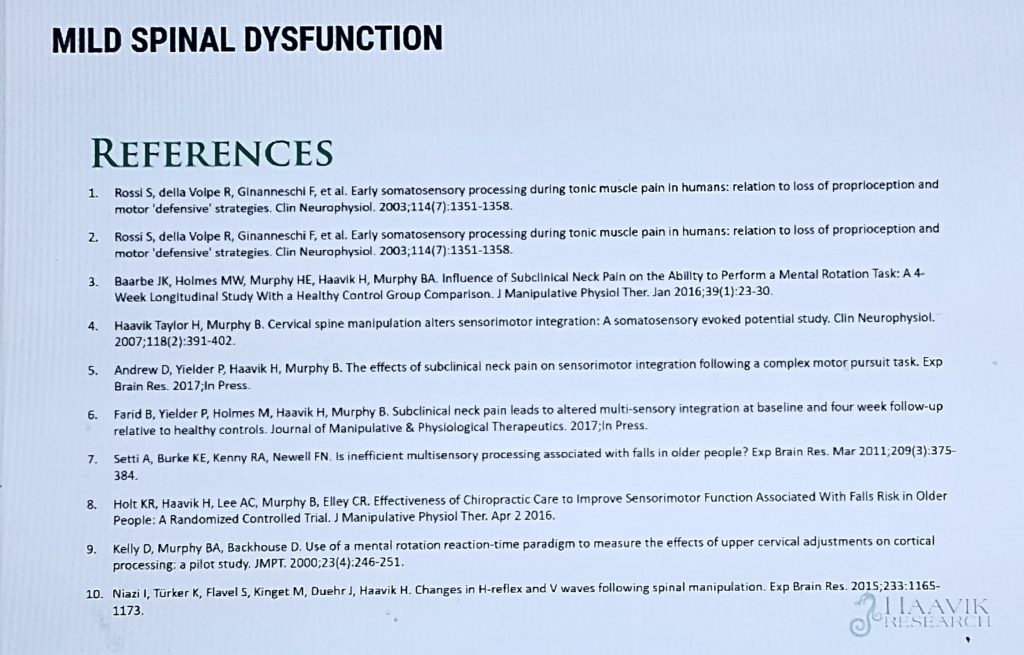‘Mild’ Spinal Dysfunction May Cause Serious Problems Far Beyond Pain and Stiffness
Researchers looked at the effects of subclinical pain on brain function.
- Sub-clinical pain is this case means that the individuals had a history of mild pain or stiffness in the spine regardless of history of trauma.
- The people in the study were not experiencing any pain at the time of testing which is important because pain itself will cause some changes in the brain.
- The people in the study also had not previously gotten any treatment for spinal pain.
- The researchers found that even on days when the people had no pain, the spinal dysfunction caused changes in brain function.
Check this out…
The people that had a history of spinal pain had a reduced ability to know where their arms were in space when they closed their eyes.
This has significant implications for reducing injuries, participating in various hobbies, and obviously sports performance.
A 2nd study found that people without pain and with a history of spinal dysfunction (without chiropractic treatment) were slower at the task of mentally rotating an object in space to visualize how it would look.
She mentions being able to rotate letters in space as an example.
Interestingly, dyslexics have a problem with the orientation of letters and numbers which is what defines the common symptoms of dyslexia.
This is something that we often do as we move around our environments and reach for things.
So we see that spinal dysfunction even without pain alters our brain’s ability to know where we are in space and to understand other objects around us in space.
A 3rd study looked at the person’s ability to perform complex movements of their hands.
The mild spinal dysfunction group that had no pain but a history of mild neck pain performed significantly worse on the task compared to those with no history of spinal problems.
The researchers also found that the spinal dysfunction group were unable to learn the movements whereas the healthy group could learn the hand movements.
Very interesting!
A history of mild neck pain with no chiropractic treatment meant that the people had problems learning movement patterns.
Again, this would appear to have significant implication for reducing accidents, work injuries, home injuries, and hurt sports performance.
A 4th study found that poorly functioning necks (non-painful) had difficulty processing information from their other sensory organs including their eyes and ears.
This is important because losses in ability to process visual and hearing information effects every part of our lives, including our ability to respond to challenges in our environment like seeing something on the floor and avoiding it rather than tripping over it.
A 5th study demonstrated that chiropractic care could improve an elderly person’s ability to process information from their eyes and ears.
This can help them be able to avoid falls which is a major risk factor for aging adults.
A 6th study demonstrated that chiropractic treatment of the neck could improve an individual’s ability to contract their leg muscles making the person stronger.
Pretty amazing stuff!
The big ideas here, the take home messages, about this information is…
- There is much more going on with both spinal problems and chiropractic than anyone really realizes outside of the very few that look at this info… even though this short video only barely scratches the surface.
- The spine and the brain are very well connected with problems, even a small spinal problem potentially causing significant problems in the brain.
- These problems talked about here revolve around being able to move our bodies in a coordinated manner, muscle strength, our ability to know where we are in space (vertigo implications), being able to rotate objects in space (possible dyslexia implications), our balance and ability to move through our external environment (risk of falling, injuries, and sports performance, …), our ability to process visual and auditory information…
- Our brain is dependent on all sensory information which drives it’s ability to process information and control our bodies.
- Just because this is complicated and the public and virtually all health care practitioners don’t know this is happening doesn’t mean it doesn’t effect you and your family.
Should YOU and your family see a Chiropractor?
Absolutely the answer is a resounding “YES!”
This is because changes in the body and nervous system occur on an ongoing basis, some of these are problems that become ever bigger as they continue.
This undoubtedly seems very complicated.
It is very complicated and that is a big part of the problem.
Evaluation and treatment of the neuro-muscular problems and their impact on your ability to function optimally is what we do as chiropractors.
Unfortunately basically no one knows this including the public and other health care providers.
Adding to this confusion is that there are many different types of chiropractors and chiropractic approaches to treatment.
This means that you may see one chiropractor and have an entirely different experience and outcome than if you see another.
Dr. Hagebusch for example has spent hundred’s of hours taking post-doctorate courses in clinical neurology, functional neurology, and other areas to better help the thousands of Texarkana area patients he has seen since 1999 in Texarkana.
If you are interested in seeing Dr. Hagebusch at our Texarkana clinic, contact us!
We’re here to help Texarkana live healthier lives and this goes beyond pain relief for which we can help too!
References Mentioned:

 Protected by Patchstack
Protected by Patchstack
Leave a Reply